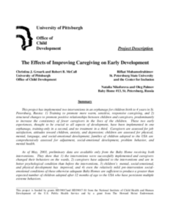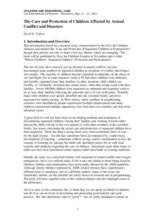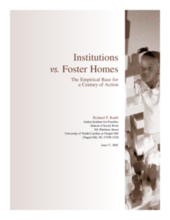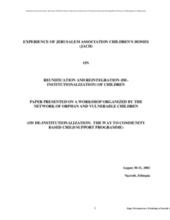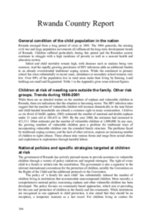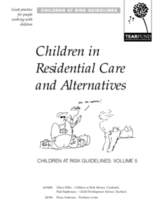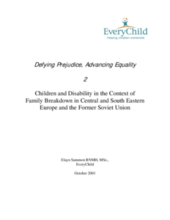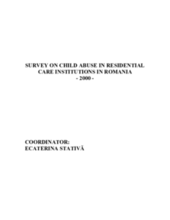Displaying 701 - 710 of 721
Through a review of orphanages in St. Petersburg, Russia, this study examines the causal roles of consistency in caregivers and appropriate caregiving behaviors in the social, emotional, and development of young children.
Overview of a research study which provides guidelines for care of separated children in large-scale emergencies, focusing on the negative impact of residential care, extended family care, spontaneous and agency fostering, adoption, and alternative placements for adolescents.
This paper examines the negative impact of institutional care in central eastern Europe, the Commonwealth of Independent States and the Baltics region. It promotes community-based care alternatives and provides statistics. It also includes a list of useful resources addressing orphaned and vulnerable children.
A review of institutional care and family-centered care with a discussion of both positive and negative aspects of group care. This review paper is primarily focused on showing the inefficacy of group care and recommending other forms of care such as kinship care and even foster care as options that are more cost effective and better for children’s development.
This paper provides a guideline for the implementation of reunification and reintegration programs for agencies providing institutional care for orphans. It outlines the different strategies and activities an organization in Ethiopia used to transition from institutional care to community-based childcare projects.
Country report of Rwanda on the situation of children in residential care in anticipation of the Second International Conference on Children and Residential Care: New Strategies for a New Millennium, to be held in Stockholm 12 – 15 May 2003.
A series that provides a framework for good practice and guidelines for those who work in the area of child development policy. The series delves particularly into residential care and other alternatives of care and makes suggestions for reform by evaluating 6 case studies of good practice examples.
A study on children with disabilities in the context of family breakdown. Includes overviews and statistics from 10 countries, a call for strengthened family support services, and draft guidelines on how child agencies can better mainstream these issues into their work.
Report assessing the overall features of children in residential care institutions with consideration for families of origin, gender, socioeconomic status and type of institution.
This document provides supplemental information to a study conducted on the situation of children in institutional homes in Ghana.

